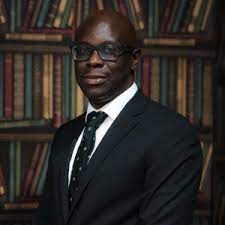The President of the Gambia Bar Association, Salieu Taal, speaking at the opening ceremony of the 2023 Legal Year, said, “the Gambia we decided is yet to be realised.”
“Today in 2023, we still have the same 1997 constitution, the same criminal code, public order act, elections decree, and draconian practice directions from the Jammeh Era. The legal order of the previous dictatorial regime is still intact yet to be supplanted after 6 years of our transition from a dictatorship in 2017. The Gambia we decided on is yet to be realised. It is really DISHEARTENING to maintain the arsenal of draconian laws from the Jammeh era in our books under our current dispensation,” he said.

Counsel Taal said, as a rule of law institution, they are calling for the prioritization of a new constitution to replace the 1997 constitution and the repeal of all the “repugnant/undemocratic” laws that don’t conform to the International human rights norms and values.
Counsel Taal said they cannot speak of rule of law if the country continues to rely on laws designed for a dictatorship.
The Gambia BAR Association President made these remarks at the official opening ceremony of the 2023 Legal Year.
The BAR Association President also talked about the challenges the Gambian Judiciary is faced with, as well the delay of cases at the courts. He also emphasized the importance of the TRRC Recommendations and urged the Gambia government to implement them.
“The Bar commends the Ministry of Justice under the leadership of Honourable Dawda Jallow and by extension the Government of President Adama Barrow for the Decision to establish a hybrid court (Internationalised domestic mechanism) in partnership with ECOWAS to try those who bear the greatest responsibility for the gross human rights violations and abuses committed during the 22 years of the former regime.
“The Bar will continue to support and complement the efforts of the Government in the implementation of the TRRC recommendations, particularly in the area of criminal accountability. The Gambia has made a name globally for establishing a very successful truth-seeking process that was very transparent, inclusive, and participatory. From truth-seeking, it is imperative to ensure there is justice and accountability for the atrocities committed against Gambians and other West Africans,” he said.
Counsel Taal said without justice, reconciliation will be a tall order and that there cannot be a meaningful truth-seeking process, reconciliation, and healing in the absence of addressing impunity and the question of justice and accountability.
Counsel Taal further stated that it is important to ensure that the TRRC implementation transcends partisan politics and that the quest for justice after the truth-seeking process is recognized as an integral part of coming to terms with “the brutal past” and saying no to impunity.
The BAR Association President called on the Gambian Leader President Adama Barrow to personally champion the implementation of the TRRC recommendation to ensure accountability and reconciliation.
“Your Excellency, in Dec 2016 we turned to a new chapter when we decided to boot out dictatorship and tyranny under your leadership. The last leg of the journey is to ensure that Gambians will Never Again to be subject to such brutality and abuse by anyone or the system. This we owe to generations of Gambians to come,” Counsel Taal said.
On the issues of the challenges and shortcomings of the Judicial sector, from 2017 to date, the demand for justice through the courts has increased exponentially. The increase, he lamented, is due to the public’s increased expectation of the impartiality and independence of the judiciary following the 2017 democratic transition.
Counsel Taal said from 2017 to date, the judiciary has delivered landmark judgments which amongst other things have reiterated the supremacy of the constitution, the limits of legislative authority, the limits of executive power, the enforcement of fundamental rights, and the limits of constitutional immunity.
Counsel Taal said these judgments, rulings, and dicta from the courts in many respects are helping shape the contours of the country’s “nascent” democracy and importantly reassert the culture of respect for the rule of law.
“Whilst we acknowledge the positive strides made by the judiciary, it is important to highlight some of the challenges faced in the administration of justice by litigants in the jurisdiction. As mentioned in my previous statements before, the road to justice is still a pipe dream for the average litigant in the Gambia and a long one for that matter. High-profile cases tend to get expedited hearings and are concluded in relatively shorter periods.
“However, the majority of cases, both civil and criminal, can take an inordinate amount of time to be concluded in our jurisdiction. The delays in the conclusion of cases are even more problematic in criminal cases, especially about accused persons charged with non-bailable offences or indigent defendants unable to fulfil bail conditions. The private bar, Ministry of Justice, the police, and the Bench all have a collective responsibility to do more in this regard to help expedite the delivery of justice effectively and efficiently,” he said.
Counsel Taal, who is also a member of the Gambia General Legal Council, said another challenge faced by litigants in the jurisdiction is the long delays and difficulties faced in the enforcement of judgments, particularly in land matters, is fraught with serious challenges and difficulties in the Gambia. He said it is not unusual for litigants to have judgments and yet be unable to enforce their judgments over several years after the exhaustion of all appeals.
Counsel Taal said the current state of affairs about the enforcement of judgments is deplorable and needs urgent attention, saying, non-enforceability or undue delays in the enforcement of judgments seriously undermines confidence in judicial processes.
“We are pleased to learn that the judiciary is cognizant of the aforesaid challenges, bottlenecks, and undue delays in the dispensation of justice and has plans to address the same. The Bar as a stakeholder looks forward to working closely with the judiciary in its quest to review the rules of courts to help ease the bottlenecks in the court system. In this regard, the bar looks forward to participating in the workshop organized by the judiciary as part of the legal year celebrations to look at proposals to amend the high court and subordinate rules,” Counsel Taal said.
Counsel Taal said the Bar welcomes the piloting of Computer Aided Transcription Systems (CATS) in courts within the High Court and is also happy to learn of the Judiciary’s plan to roll out the system across the judiciary.
He said the introduction of the CATS system in the superior and subordinate courts will have a great impact on increasing the efficiency of the courts.
The Legal Year is an important event in the Judiciary’s calendar, as it offers judicial officers the opportunity to showcase their activities and accomplishments. It also marks a period when the Judiciary reflects on its challenges and charts out a way forward to ensure an effective and efficient dispensation of quality Justice.
As part of this year’s event, a series of activities will be held including The annual Call to the Bar Ceremony, Forum on Business & Human Rights for Judges, Training of District Tribunal Chiefs & Scribes, Workshop on the reforms of the Rules of Practice, Workshop on case Management, the inauguration of the Bundung New courts Complex,
The activities of the inauguration will also include Training of Magistrates in dealing with Vulnerable witnesses, The Inauguration of the General Legal Council Offices, Sentencing Council & Wider Sentencing Stakeholder Group Conference, Official taking over land allocated for the construction of a law court complex in Brikama, Partnership conference with Justice Defenders, Magistrates, and Judges, and Official taking over land allocated for the construction of court facilities in Kerewan.
By Landing Ceesay


